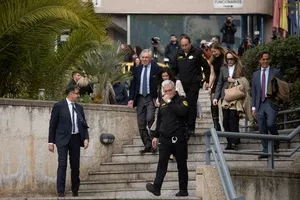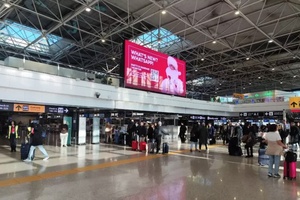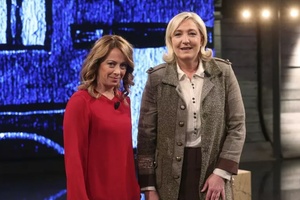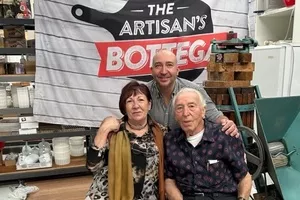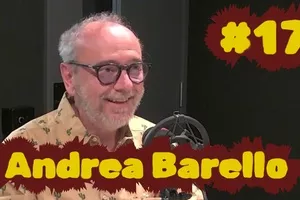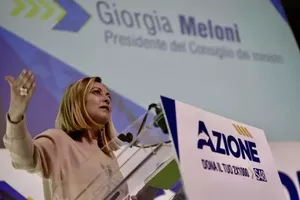Charlotte Rinaldi spent her childhood in Bologna, then at just 13 years old moved to Port Douglas in northern Queensland with her brother and mother.
Her mother’s decision was dictated by a desire for radical change. “Coming from a crowded city like Bologna and suddenly finding immense space at your disposal, boundless nature and a house with a swimming pool was a dream,” says Rinaldi, describing the move.
However, change did not come without sacrifice and pain. The year the Italian-Australian actress moved was also the year she lost her father.
Her suffering was compounded by the difficulty of having to learn a new language. “A different country, a different language, the kids were different from my peers in Italy, I couldn’t understand how to integrate, so it took me some time to make friends,” she explains.
“There were times when I felt very lonely.”
As is inevitably the case in stories with happy endings, her life slowly took a different turn. Once she enrolled in high school and attended the Port Douglas Municipal Theatre, her dreamy and extroverted personality found refuge in acting, allowing her to fully express herself.
Her theatre training then continued at the Australian Institute of Music in the drama department, where she earned a degree in the same discipline.
“It was really a wonderful year. I moved to Sydney where I had the opportunity to immerse myself in an extremely creative environment,” shares Rinaldi, who graduated at a very young age back in 2016.
“Once I finished my degree it was difficult trying to figure out how to create a career as an actress, but I was always very determined.”
Rinaldi opens up about the obstacles she encountered on her way to establishing herself as an Italian actress in Australia.
“As I was not born here, I have an accent and in Australia they tend to cast actresses and actors only with an Australian accent,” she explains, adding that some time ago she was explicitly told that because of her Italian accent she would not receive many castings.
“This is a real shame,” the Bologna actress continues, “it often happens that during castings they look for people from different cultures, but still with an Australian accent.
“So ethnic, but not too ethnic.”
According to Rinaldi, in the world of the cinema actors are often chosen for merely having an Italian surname. This often gives a distorted idea of Italian culture in the world.
“People from all cultures are represented in cinema, but Italians always seem to be stuck in the stereotype of Italian Americans,” she laments.
Rinaldi made her directorial debut in 2022 during the pandemic, with a ten-minute short film titled Isolated.
“As an actress, you can either try to hire an agent and hope to get a gig to act in a film, or be proactive,” she shares.
“I took the opportunity during the lockdown because I had so much free time on my hands.
“I decided to write my first short film, I directed and wrote it myself and also did the soundtrack.”
Isolated had 15 nominations worldwide, with three wins: Best First Time Director at the Rome International Movie Awards, Best Mystery at the Hollywood Blood Horror Festival and Best First Time filmmaker at the London Indie Short Festival.
“I didn’t expect anything, I did it more for me and receiving all these wins was really an unexpected surprise,” says Rinaldi, “which gave me a boost that made me think I could do it seriously.”
The Bologna-born actress would love to work with Danny and Michael Philoppou, whom she describes as “two Australian directors who started making films with each other and became successful. They are a real source of inspiration for me.”
Rinaldi is currently preparing to go on stage with a show at the Casula Power House Art Centre entitled The shifting heart.
The play deals with the migration experience of an Italian family in Melbourne in the 1950s, in which Rinaldi plays Maria, the daughter of the main family and wife of an Australian who is nine months pregnant. Maria is one of the story’s pivotal characters.
The character is a strong woman, she denounces the manner in which Italians are treated in Australia. She raises issues such as racism and the difficulties of integration in a society that does not seem to truly want diversity. She does so by expressing her thoughts, without fear.
Rinaldi describes her relationship with the Italian community in Australia very fondly. “Every time I meet an Italian here, I am happy,” she says.
“We understand each other with a glance and we recognise each other immediately.
“Years ago, I was working in Haberfield in a home-made pasta shop unable to find full-time work as an actress. I was serene because I knew that at least in my community I would be able to find a job.
“In doubt I know that here there is a big Italian family where I can find myself, feeling almost at home.”



















